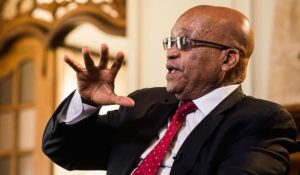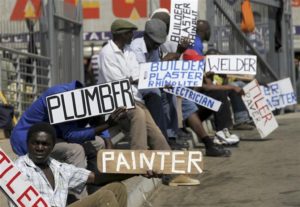MAY 16, 2017
An analyst from Washington think-tank Cato Institute – which is dedicated to the principles of individual liberty, limited government, free markets, and peace – has written a hard-hitting assessment of South Africa, in which he says the country is flirting with being designated to the dustbin. Marian L. Tupy, who is a senior policy analyst at the Cato Institute’s Centre for Global Liberty and Prosperity, says South African politicians’ radical swing to the left risks leaving the country far behind the rest of the world. Talk of radical economic transformation has started sending jitters through the markets with fears of a Zimbabwe-style meltdown. Already, the country also finds itself in junk territory with major credit rating agencies, bar Moody’s (at least for now). The future is murky and unless the ANC gets its house in order, the largest political movement in the country could take the country down with it. The article was first published on CapX. – Gareth van Zyl
 By Marian L. Tupy*
By Marian L. Tupy*
Politicians, being no better than the people who elect them, seek to further their agenda by following the path of least resistance. Nowhere is this more obvious than in contemporary South Africa, where the legacy of a peaceful transfer of power from the white minority to black majority is daily undermined by politicians seeking to gain short-term advantage at a long-term cost to the country.

The African National Congress, which has been in power since 1994, has promised prosperity and tranquillity to the citizenry, but delivered neither. Protests over a lack of housing, water, electricity, jobs and personal safety are erupting all over the country, and the government, immobilised by incompetence and rotten with stratospheric levels of corruption, has found itself under an assault by a Maoist group of ex-ANC rebels.
In response to the growing pressure from the radical Left, the ANC has joined in the scapegoating of the white minority, thus throwing Nelson Mandela’s dream of a multi-racial “rainbow nation” on the ash heap of history.
The main culprit responsible for South Africa’s descent into renewed racial animosity is the former leader of the ANC youth-wing, Julius Malema. The leader of the preposterously-misnamed Economic Freedom Fighters has been building his own power base, by appealing to all those left behind by the ANC’s misrule.
According to Malema, “This country is still in the hands of white people… They have been enjoying themselves because they always owned our land… We are not calling for the slaughtering of white people, at least for now. What we are calling for is the peaceful occupation of the land and we don’t owe anyone an apology for that… White minorities be warned. We will take our land. It doesn’t matter how. It’s coming, unavoidable. The land will be taken by whatever means necessary [my emphasis].”
To protect his left flank, South Africa’s President Jacob Zuma has joined in the race baiting and thrown his support behind the EFF’s batty proposal to expropriate what remains of the white-owned farmland without compensation. The first step on the road to Zimbabwe-styled economic meltdown, Zuma says, will consist of a “pre-colonial land audit of land use and occupation patterns” that will determine what land needs to be taken.

South African President Jacob Zuma. Photographer: Waldo Swiegers/Bloomberg
Since the move would require an overwhelming majority in Parliament, Zuma noted that “We [the ANC] need to accept the reality that those who are in Parliament where laws are made, particularly the black parties, should unite because we need a two-thirds majority to effect changes in the constitution.”
And that is the voice of moderation. To get a sense of how far out of the global mainstream South Africa’s intellectual atmosphere really is, consider the ideas of University of the Witwatersrand (my alma mater) economics Professor Chris Malikane, who advises the country’s Finance Minister, Malusi Gigaba.
Malikane has recently called for “expropriation of white monopoly capitalist establishments such as banks, insurance companies, mines and other monopoly industries.” “It’s true,” he conceded, “that this country will plunge [into crisis] and become like Venezuela and Zimbabwe.” But, Malikane asked, “Did you think to transform is going to be nice? We need a two-thirds majority to change the Constitution. Otherwise, to achieve what we want to achieve, we need to go that route [take up arms]. Let’s try two-thirds. I don’t like war.”
This is insanity writ large.
First, consider the issue of collective guilt. A substantial minority of white South Africans never supported the National Party and its apartheid policies and liberal, which is to say racially inclusive, political parties were always represented in South Africa’s all-white Parliament. In fact, the NP came to power as a result of a quirky first past the post electoral system. In 1948, it won the most seats in Parliament, but lost the popular vote by a hefty margin.
Since 1994, when the ANC replaced the NP as a dominant force in South African politics, tens of thousands of whites, including Eastern Europeans and Americans, have immigrated to South Africa. Last but not least, let us not forget the post-1994 generation of white South Africans, who never experienced apartheid, supported it or condoned it. None of these groups deserves blame for the past racial discrimination of black South Africans.
Civilised societies apportion blame individually, not collectively. Thus, following the collapse of communism in Central and Eastern Europe, democratically-elected governments in the former Soviet bloc prosecuted individual communist leaders, such as those who ordered the shooting of citizens trying to escape to the West. Former communists were not, typically, targeted as a group.
Second, consider the economic impact on the country. South Africa’s GDP per capita is ZAR 71,788 ($5,357). If the property of all non-blacks was expropriated and if all non-blacks left the country, the GDP per capita would rise to ZAR 88,974 (i.e., 24 per cent). Conversely, if the economic growth rate in South Africa picked up from the current 0 per cent to 7 per cent, the country’s GDP would double over the next decade.
It is noteworthy that Deirdre McCloskey’s recent New York Times article estimates that “As a matter of arithmetic, expropriating the rich to give to the poor does not uplift the poor very much. If we took every dime from the top 20 per cent of the income distribution and gave it to the bottom 80 per cent, the bottom folk would be only 25 per cent better off.”
Similarly, there are about 30 million blacks of working age in South Africa. Of those, 11.5 million have a job in either the formal or informal sectors. That makes for a labour market absorption rate of 38 per cent. There are also 1.9 million white workers. If all the white jobs were somehow “given” to blacks, the black labour market absorption rate would rise to an estimated 44.6 per cent – still one of the worst in the world (the above data was provided to me by the inestimable South African Institute of Race Relations).
 

File Photo: Men hold placards offering temporal employment services in Glenvista, south of Johannesburg. REUTERS/Siphiwe Sibeko
This scenario is based on two impossible assumptions. First, it assumes that all those formerly white jobs would be sustained. But that can’t happen, because South African blacks do not, as a result of the collapsing education system in the country, have the work skills of white South Africans. Second, it assumes that there would be no further disruptions to the economy. Yet, as McCloskey again points out, “redistribution works only once.” As was the case in Zimbabwe, expropriation of property owned by non-blacks would lead to economic meltdown, as generously acknowledged (and desired) by Professor Malikane.
The ANC has spent the last 23 years running South Africa into the ground. Faced with the real possibility of losing the next parliamentary election, the party has decided to turn further to the Left. Instead of growing the economy through tough, but necessary, market reforms, the ANC is moving toward expropriation, nationalisation and “redistribution”. That may be a path of least resistance, but it is a path to ruin.
*Marian L. Tupy is senior policy analyst at the Cato Institute’s Centre for Global Liberty and Prosperity. The article first appeared on CapX.

GARETH VAN ZYL
MAY 16, 2017 | ANC, BNT5, CATO INSTITUTE’S CENTER, CHRIS MALIKANE, DEIRDRE MCCLOSKEY, EASTERN EUROPE, FINANCE MINISTER, JULIUS MALEMA, MALUSI GIGABA, MARIAN TUPY, NELSON MANDELA, PM, SOUTH AFRICAN INSTITUTE OF RACE RELATIONS, SPECIAL, VENEZUELA, ZIMBABWE
Path to ruin: Why SA risks landing on ash heap of history – Cato analyst

